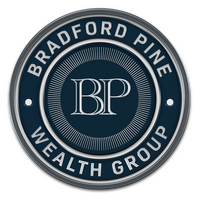
Bradford Pine Wealth Group
Like anyone in business, I’d like to think that I’m at the top of everyone’s list of potential wealth advisor. But the reality isn’t that simple: working with an advisor is a two-way street, and the most successful relationship is one in which your needs and preferences are compatible with the business of the person you’re working with.
If you’re looking for a new advisor, it can be hard to know where to start. The first thing you want to do is avoid falling into the trap of knowing that you don’t have the right financial advisor but feeling too busy or too awkward to make the change. Even if you’ve been with your advisor for a long time, if it’s not the right fit any more he or she will understand (and if they don’t, that could be a bad sign in itself!).
To help you start the process and get a handle on what you’re looking for, consider these 5 questions when looking for a financial advisor or reviewing your existing relationship. They’ll give you a framework to evaluate each advisor you come across and help you make the decision that’s best for you.
-
Check the advisor’s reputation
For any advisor — present or potential — your first priority should be to check their background. These days, it’s extremely easy: just go to the Financial Industry Regulatory Authority’s BrokerCheck website and type in the person’s name, and it’ll give you information about any regulatory actions or official customer complaints. It’s actually surprising how many advisors have a mark on their record, which is something you should know about.
BrokerCheck is a great tool and I highly recommend that you use it. You can also supplement your search with some sleuthing on Google, which could also be helpful.
Either way, be sure to take a bit of time to do some homework as part of your due diligence process — background research is always worth it.
-
How much service and contact do you need?
Once you’ve checked background, consider the type of help and service you’re looking for. Are you the kind of person who just wants a little bit of help implementing a financial plan that you can run yourself? Or do you want to be able to check in and meet regularly to discuss your plans and progress?
These may be the most important questions you ask yourself, so be sure to really think about it.
Service level is a major distinction among advisors: some run full-service practices that are very hands-on, and some have a larger volume of clients who they don’t speak to very often. One way of doing things isn’t necessarily better than the other. Finding the right fit depends on the complexity of your financial situation, the type and amount of advice you’re looking for, and your preferences when it comes to meetings, phone calls, and touching base.
Of course, there’s often a trade-off between fees and service. If you’re looking for the lowest-cost advice possible, you should be aware that the quality of service is also likely to be lower. The opposite is also true: if you’re looking for an advisor who will always be happy to chat, or who will help quarterback tax season with your CPA, you’ll likely find that he or she will charge more than a discount broker (but please note that those fees shouldn’t be outlandish!).
-
How independent is the advisor?
Some advisors work for the big wirehouses, where they offer in-house investment options and management. Others are independent, meaning that they aren’t directly affiliated with or employed by a large bank. Independent advisors can access a lot of the products offered by the banks, but they aren’t beholden to any one of them.
If you have all your banking, assets, loans, and credit cards with one bank, you’re a happy customer, and you like the name recognition of working with a large firm, it might make sense to stick with them for investment advice. Wirehouses have an enormous amount of infrastructure and can typically offer the best of what they have to most of their customers.
Unfortunately, the best of what a single bank has might not be the best in class: after all, it’s pretty much impossible to be the best at everything. That means the advice you get could be biased towards internal investments or products, even if they aren’t the best ones available. Also, the large banks are focusing more and more on ultra-wealthy customers, a strategy that might come at the expense of smaller investors.
You might be asking yourself: but don’t banks offer services, like hedge funds, that an independent advisor can’t access? This used to be the case, but in this day and age it’s less and less relevant. Independent advisors can access comparable (and in some cases better) investments, and technology has completely changed the kind of infrastructure required to run a top quality firm.
Generally speaking, independent advisors have the benefit of not having to toe the corporate party line, and I believe that in most cases independent advisors have access to a broader range of investment options. Therefore, while they don’t typically have the branding and marketing power of the banks, independent advisors usually have much more flexibility in what they can offer you.
With the potential for less bias towards a particular package of products and possibly lower fees, it could be a better deal.
I’m an independent advisor for many reasons, and I believe my independence offers tangible benefits to my clients. But the right choice ultimately depends on you. Either way, once you have a sense of what you prefer, it will be much easier to go through the rest of the search process.
-
What credentials or experience are important to you?
When it comes to your finances, you might feel more confident with someone who has been providing advice for decades. Then again, you might find that you have a better rapport with someone younger or newer to the field. Sometimes it can be hard to know what you prefer until you start talking to potential advisors — you might surprise yourself!
I would advise this, though: if you’re looking to work with someone with fewer years in the industry, take a look at their qualifications, mentorship figures, or the infrastructure around them. The financial world is complicated and getting more so every day, so you want to be sure that the person you’re working with understands the subjects that will affect you and your life.
Of course, that same thought process should also apply to those who do have years of experience — if you need some help with an issue that your advisor has no experience with, no number of decades in the industry will make up for it. I’m certainly not one who would want to be the “guinea pig” client!
-
How much does proximity matter?
Finally, try to assess your potential advisor based on location. For some people, an advisor is someone you can easily communicate with over the phone and email. With advancements in technology and communications — whether it’s Skype, Facetime, or some other means — you can now see your advisor face-to-face without ever leaving the house. For others, however, it’s critical to be able to look their advisor in the eye when discussing important financial issues.
What works best for you could be completely different than what works for someone else. In my case, I work with clients all over the country. Some are local, some are far away. Some I see regularly, and some I’ve never met face-to-face. All of these relationships work because they’re structured in a way that fits the needs of the client.
If you want to work with someone in town, it obviously will narrow the field considerably. Alternatively, if proximity isn’t that important to you, you can focus on finding an advisor who best fits your needs on another level, like expertise or service level. This could give you a much broader selection of potential advisors.
Parting words: Follow your gut instinct
At the end of the day, choosing an advisor is about finding the right balance of service levels, experience, independence, and proximity (for most people, performance is a given). But after you’ve gone through those factors, try to check in with your gut instinct. If you feel comfortable with your advisor and feel that he or she is listening, understands your needs, and is fully invested in you, you could be on the right track to a great relationship.
On the other hand, if your gut is telling you “no” even if the advisor meets all of your other criteria, it’s important to step back and consider why. If you’re not comfortable, you simply won’t have a great relationship.
You might be surprised that I’m talking about gut instinct instead of investment performance. Don’t get me wrong: we all like good performance, but a financial advisor is much more than a stock picker. This is a person who typically knows the most intimate details of your financial life and will play an important role in guiding your family through both good times and bad. That’s a service that goes way beyond asset allocation.
That’s why I always tell people this: hearing others talk about how much money they’re making on their investments is not a good reason to drop your existing relationship. If you’re happy with your advisor and feel that he or she has built a well-diversified portfolio and is keeping your best interests at heart, don’t let dinner party boasting undermine that. People have a tendency to exaggerate and share only their best stories.
That being said, if you’re concerned, uneasy, or just plain unhappy, it might be a good idea to look for someone new. The right fit is out there, and with the answers to these five questions in mind you’ll be well on your way to finding it.
As always, I’d love to hear your feedback on how this thought process worked out for you, and I’d be happy to answer any questions you may have as you embark on your search.
.
Written by Bradford Pine with Anna B. Wroblewska
.
To learn about retirement savings, download my free eBook, “10 Tips You Need to Know About Your IRA Rollover.” This short book is packed with critical information that will help you make the right decisions about your retirement savings.
Written by Bradford Pine
Bradford Pine Wealth Group – New York City Financial Advisors
The views and opinions expressed in an article or column are the author’s own and not necessarily those of Cantella & Co., Inc. It was prepared for informational purposes only. It is not an official confirmation of terms. It is based on information generally available to the public from sources believed to be reliable but there is no guarantee that the facts cited in the foregoing material are accurate or complete.
Comments may not be representative of the experience of other investors. Investor comments and experiences are not indicative of future performance or results. Views and opinions expressed in the comments section are the author’s own and not those of Cantella & Co., Inc. No one posting a comment has been compensated for their opinions.


Comments are closed.